
Kim Suozzi, a 23-year-old neuroscience student with terminal brain cancer, received her dying wish of cryonic preservation on Jan. 17 after a successful fundraising campaign launched on the internet.
Cryonic preservation freezes legally-dead people to liquid nitrogen temperature to stop physical decay. People undergo it in the hope that future technology will exist to revive their bodies and restore them to good health.
Suozzi announced her desire for cryonic preservation on Reddit, a social media website, in August 2012 after learning she had less than a year to live.
“I’ve been interested in cryonics since long before I was even diagnosed, but I never thought that I would have to secure the finances so fast, and without a career or savings to stand on,” she wrote.
The procedure runs anywhere between $28,000 and $200,000 depending on the options chosen, according to io9.
Suozzi’s request was picked up by the Society for Venturism, a non-profit futurist group that advocates cryogenics.
The combined fundraising efforts succeeded and Suozzi went into cryosuspension at the Alcor Life Extension Foundation in Scottsdale, Ariz., on Jan. 17, the society announced.
The likelihood of a person coming back to life using current freezing techniques is nil, Arthur Caplan, director of the Center for Bioethics at the University of Pennsylvania, told NBC News, especially given the vulnerability of cells to frosting and defrosting.
“It wouldn’t take a lot of damage to shift somebody from being a reconstituted person to being a reconstituted vegetable,” he said. “You don’t need that much cell damage to cause harm.”
Even if a person were successfully restored, “you’re going to be kind of a freak,” Caplan added.
For one, in century or two, a person is unlikely to harbor immunity to flu or other diseases of the time and could easily get sick and die upon first contact. Caplan likened the effect to the devastating spread of disease among Native Americans upon first contact with Europeans.
“Socially you are facing trouble because you are going to be this weird object of curiosity,” Caplan added. “Friends are gone. No one is there. I would worry you quickly become isolated and depressed.”
Despite the unlikelihood of success and weird reality a person would wake to if cryonic preservation did indeed work, Caplan said people will still likely spend hundreds of thousands of dollars giving it shot.
“I think it is a ripoff,” he said. “The dream of immortality is powerful, but I think it’s just a pipe dream.”
Suozzi was aware of the controversy and doubts surrounding cryonic preservation, but pursued it nevertheless. “It’s a better shot at living again than if I were decomposing somewhere or cooked into ash,” she wrote.
John Roach is a contributing writer for NBC News Digital. To learn more about him, check out his website. For more of our Future of Technology series, watch the featured video below.